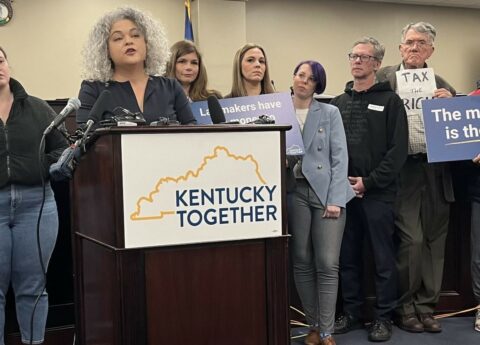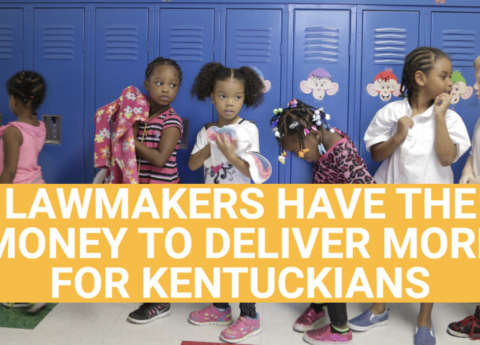Report available here: www.ctj.org/bushtaxcuts2012.php
New Analysis Finds Extending All Bush Tax Cuts Would Give Richest One Percent of Kentuckians $28,200 Per Year More and Give Poorest 20 Percent $100 Less on Average than President’s Approach
Comparison of Two Approaches to Extending Some or All of the Bush Tax Cuts for All Americans Released Today
Middle-income and low-income Kentuckians would pay slightly more in taxes under the Congressional Republicans’ approach to extending the Bush tax cuts than they would under President Obama’s approach, while high-income Kentuckians would pay far less under the Congressional Republicans’ approach, according to a new analysis from the Institute on Taxation and Economic Policy (ITEP) and Citizens for Tax Justice (CTJ). National figures show the same pattern.
“What we need most right now in Kentucky is public action to create jobs through investments in areas like energy and infrastructure, assistance to struggling families, and aid to roll back damaging state budget cuts,” said Jason Bailey, Director of the Kentucky Center for Economic Policy. “Extending tax cuts targeted only to the wealthiest is not an effective strategy to spur economic growth. All it does is feed the trend toward growing inequality in our state and in our country.”
Both plans analyzed in the report would give big tax cuts to those at the top, but the proposal to extend all of the tax cuts gives substantially larger benefits to the richest one percent. Under President Obama’s approach, in 2013, the poorest 20 percent of Kentuckians would receive an average tax cut of $150 while the richest one percent would get an average tax cut of $16,920. Under the Congressional Republicans’ approach, the poorest 20 percent of Kentuckians would receive an average tax cut of $50 while the richest one percent would receive an average cut of $45,120.
The study also finds that in 2013: Of tax cuts that go to Kentuckians under the President’s approach, 2.1 percent would go to the poorest 20 percent, 11.9 percent would go to the middle 20 percent and 11.8 percent would go to the richest 1 percent; under the Republican plan, 0.6 percent of the cuts would go to the poorest 20 percent of Kentuckians, 9.2 percent would go to the middle 20 percent and 27.3 percent would go to the richest one percent.
The Bush tax cuts extension outlined by the President would cost one trillion dollars less over 10 years than would making all the Bush tax cuts permanent.
“Both President Obama and Congressional Republicans have proposed to extend far too many of these unaffordable tax cuts,” said Robert S. McIntyre, director of Citizens for Tax Justice. “But if we have to choose between the Congressional Republicans’ and President Obama’s approach, the President’s proposal is fairer and more responsible.”
The term “Bush tax cuts” refers to income tax cuts and estate tax cuts enacted in 2001 and 2003 and extended several times since then. In 2009, President Obama expanded some parts of these tax cuts that benefit low income and working families. In December of 2010, the President and Congress agreed to extend all of these tax cuts through the end of 2012.
The Republicans in Congress have indicated that they would extend all of the tax cuts first enacted in 2001 and 2003, but not the 2009 expansions for lower income families. President Obama wants to extend the 2001 and 2003 tax cuts only for the first $250,000 a married couple makes annually, or the first $200,000 a single person makes. Obama also wants to extend the 2009 expansions.
The report also addresses the economic effects of tax cuts versus direct government spending and cites Moody Analytics research concluding that government spending is more stimulative by a factor of five, or more, than tax cuts.
The full report is available at www.ctj.org/bushtaxcuts2012.php and shows the specific distribution of the benefits, and amounts of tax cuts, from the two different approaches in each of the fifty states and the District of Columbia as well as nationally.
###
Citizens for Tax Justice (CTJ), founded in 1979, is a 501 (c)(4) public interest research and advocacy organization focusing on federal, state and local tax policies and their impact upon our nation ( www.ctj.org).
Founded in 1980, the Institute on Taxation and Economic Policy (ITEP) is a 501 (c)(3) non-profit, non-partisan research organization based in Washington, DC that focuses on federal and state tax policy. ITEP’s mission is to inform policymakers and the public of the effects of current and proposed tax policies on tax fairness, government budgets, and sound economic policy (www.itepnet.org).
The Kentucky Center for Economic Policy is a non-profit, non-partisan initiative that conducts research, analysis and education on important policy issues facing the Commonwealth. Launched in 2011, the Center is a project of the Mountain Association for Community Economic Development (MACED).



